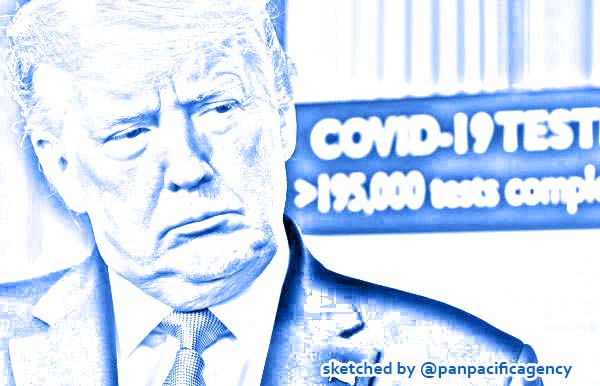[Analytics] Redefining the global ‘new normal’ after Covid-19

US President Donald Trump stands during a news briefing on the administration's response to COVID-19 in Washington DC, United States, 21 March 2020 (Photo: Reuters/Joshua Roberts). Sketched by the Pan Pacific Agency.
Pundits are comparing the COVID-19 pandemic to the ‘Spanish Flu’ of 1918 to tease out lessons for how to combat future pandemics. Ooi Kee Beng specially for the East Asia Forum.
However, the world back then and the world today are very different. If what we are searching for is approaches that can help us strengthen resilience on a global scale, the period following the Second World War may be more relevant than the period following the First World War.
The 1918 pandemic killed around 50 million people worldwide, and it hit at the end of a horrific war. Governments were in tatters.
Coming to terms with the First World War — which spanned far less of the globe than the Second World War — was clouded by the chaos of falling empires. The world was not as globalised then as it is today; many of today’s nations were still colonies of the dominant European powers. In the years following the First World War, the world was not perceived in the globalised way that it came to be seen after 1945.
Furthermore, the science was also not well developed yet, and as we know, detailed genetic information about the 1918 culprit virus was only worked out at the end of the 20th century. The Chinese, Russian, Austro-Hungarian and Ottoman empires all collapsed over a short period of time. The Bolsheviks coming to power in Russia added another distraction. The League of Nations, the precursor to the United Nations, was formed as a feeble attempt to right all the things that seemed wrong with how the world was organised back then. The Second World War can in many ways be seen as a disastrous failure of those half-hearted attempts made after the First World War to put the world on a more solid footing.
It is the Second World War then that should interest us as we prepare to reorganise the world post-COVID-19. The horrors of the Nazi extermination camps were matched by news of the United States dropping atomic bombs on Japan. The destruction wrought by these two hellish images could not help but change the whole conception of ‘global order’. The major distraction which followed was the Cold War and its manifestations in Central Europe, the Middle East, Latin America, mainland China, and on the Korean Peninsula.
Many unstoppable political trends rushed to the fore. For one thing, the days of colonialism were over. There was a rise of nationalism throughout former colonies and a defeat of the extreme racism vested in Fascism and Nazism. Racism no longer formed the basis for inter-communal and international knowledge. It was far from dead in places like South Africa and Malaysia, but no longer did it seem legitimate to think in racial terms.
The ‘Age of Nations’ had arrived. The League of Nations formed after the First World War functioned in a world where most nations were not independent yet, while its successor, the United Nations organisation, which came into being after the Second World War, counted as its members a growing number of new self-determined nations in charge of their own governments.
The most remarkable cultural achievement after the Second World War was the adoption of the Universal Declaration of Human Rights. This event is most significant in the post-COVID-19 era. The Declaration not only teaches us how to relate to each other ethically, but also how we are interrelated. We are being forced to see ourselves as just one species among many, all performing on a complex and fragile stage we call Earth.
The conflicts of the 20th century brought us many insights, but it also left us greatly distracted. This may be provocative to say, but in recent decades, our worries were side-tracked more than stilled by drawn-out discourses on ‘Sustainable Developments Goals’ and ‘Climate Change’. COVID-19 is a wake-up call in that sense: the air we breathe is compromised, as is the water we drink and the food we eat. Yet we continue to act as if this status quo is fine.
The world has also continued to act with little care for how wealth and privilege have accrued for the top one per cent of Earth’s population. With huge gaps in opportunity and freedom between and within countries, it is not strange that parochialism and national defensiveness are on the rise.
We can no longer think that this ‘normal’ will continue. We need to bring about change which urgently contains the environmental, economic and existential problems the world was heading towards before COVID-19.
What better time to reimagine a true ‘new normal’ than in the aftermath of a global crisis.
What the world lacks now are leaders with vision, those who can think of the global good instead of their own re-election. In their absence, citizens should take ownership of the process of creating a ‘new normal’ that suits their children and grandchildren.
Dato‘ Dr Ooi Kee Beng is Executive Director of the Penang Institute. He is author of The Eurasian Core and its Edges: Dialogues with Wang Gungwu on the History of the World (ISEAS, 2016).